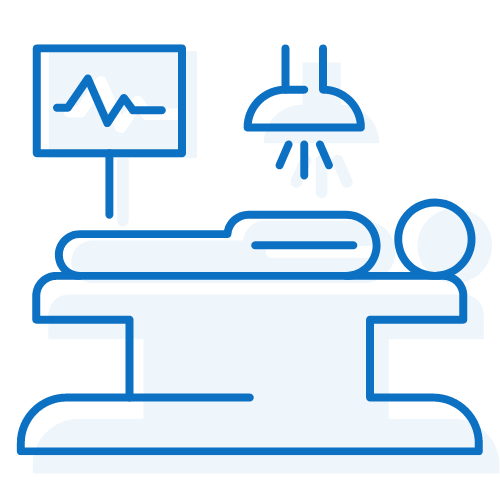Overview of Hernia
A hernia is a very common medical condition where an organ pushes through an opening in the muscle or tissue. Hernia can occur in different parts of a body. They generally appear in the abdomen, hips or chest area. Sometimes, hernia also appears in the groin area and the upper thigh. But, hernias can occur at any age. However, they are most common in men over the age of 50.
Hernia is a serious condition and can lead to life-threatening complications if not treated promptly. Some of the complications associated with hernia include intestinal obstruction, strangulation and perforation. Therefore, it is important to seek medical treatment as soon as possible if you think you have a hernia.
Free Consultation
Get Hernia treatment cost estimate
Causes of Hernia
Weak muscles and strain are the two most common causes of hernia. Hernia can develop very quickly in some cases, whereas in others, it can develop over a long period of time.Some of the major causes that can lead to the problem of hernia are:
- Heavy weightlifting- Lifting heavy weights or doing strenuous exercises for a long period of time has been found out to be a prime factor leading to hernia.
- Constipation or diarrhea- If you suffer from chronic constipation or diarrhea for long, you have a potential risk of developing a hernia.
- Persistent cough- Any factor that leads to chronic cough, such as smoking, can lead you suffer from hernia.
- Poor nutrition- Your diet plays a major role in the formation or prevention of a hernia. One can develop a hernia due to the consumption of poor quality diet or too much spicy food.
In addition to these, there are factors than increase the chances of a hernia. These are:
- Family history
- Aging
- Pregnancy
- Premature birth
- Cystic fibrosis
Symptoms of Hernia
Hernia is generally painless and causes no immediate problems. But, a hernia that keeps growing needs medical attention. Hernia, when grows big, can lead to constant discomfort and pain. This condition gets worse when the person stands for long, strains too much while urinating or bowel movement, or lifts anything heavy. If you notice that the swelling has increased or there is soreness, it is advisable to consult a doctor.In some worse cases, a hernia can develop too much and become strangulated. In that case, the person needs to go for an immediate surgery. The most common symptom of hernia is a bulge that becomes clearly visible. Depending upon the type of hernia, your symptoms may vary. Common symptoms of hernia include:
- Aching or burning sensation near the bulge
- Pain or discomfort near the groin while lifting heavy objects or coughing
- If you experience loss of smell
- Nausea and vomiting
- Trouble swallowing
- Chest pain
- Acid reflux
Types of Hernia
There are two types of varicocele which can be further categorized into 3 types.
Inguinal Hernia
It is the most common form of hernia and appear when the intestine protrudes through the weak muscles of the abdominal wall. Men are more prone to this form of hernia.
Hiatal Hernia
In this form of hernia, the stomach protrudes through the diaphragm to the chest cavity. Elderly people, especially those above 50 years are prone to this form of hernia.
Umbilical Hernia
This form of hernia is witnessed among babies and children, but can happen to adults too. In this hernia, the intestines of the child bulge out through the abdominal wall near the belly button.
Ventral Hernia
This occurs when the tissue bulges through the weak muscles of the abdomen. Ventral hernia is caused primarily due to pregnancy, obesity and constant strenuous activities.
Treatments of Hernia

Diagnosis
The doctor will perform a physical exam to diagnose the hernia. The doctor may also examine the bulge in the groin area. You may be asked to stand and cough or strain, this will help the doctor diagnose the hernia better. If the hernia isn’t apparent from the physical test, you may be recommended an imaging test like a CT scan, an abdominal ultrasound or MRI.

Ayurveda Treatment
Ayurveda is one of the traditional and most reliable forms of treatment when it comes to hernia. Ayurvedic treatment of hernia includes both therapies/ rituals and herbs and medicines.Shehana – In this process, essential or medicinal oils are massaged on the patient’s body to get rid of the toxins through different channels in the body. Tila oil or ghee is commonly used for this process.Niruha Basti – Also known as Asthapana Basti, in this process, a concoction of herbal oil and milk is used to massage the weak tissues. The patient requires to follow a proper diet after undergoing this treatment.Pinda Sweda – Medicinal oil is applied to the affected area and then a poultice of hot rice paste is applied on it.Ayurvedic herbs and medicines which are relied for hernia treatment are;
- Hingu
- Kutaja
- Senna
- Karanja
- Manjistha
- Triphala Guggulu
- Gandhak Rasayana

Surgery
The most effective way to treat a hernia is through surgical repair. If the condition of the hernia is severe, surgery is the best treatment. Painful hernias can lead to a lot of discomfort and to prevent any potential risks in the future, it is recommended that the person undergoes a surgery.Generally, there are two types of operations for hernia. They are:
- Open Hernia Surgery: In this process, the doctor makes an incision in the groin area and pushes the bulging tissue into the abdomen. The surgeon stitches the weak area, mostly with a synthetic mesh. After this is done, the surgeon closes the opening using a surgical clue or stitches it. This is the conventional process of surgery and the patient might require 3-5 weeks to completely recover.
- Laparoscopic surgery: This form of surgery is far more advanced than the conventional one and also minimally invasive. The doctor makes very small cuts in the abdomen. In this process, the doctor inserts a tiny camera called a laparoscope through the minute incision. Using the camera, the doctor diagnoses the hernia better and repairs it using synthetic mesh. This process is not painful and requires a much shorter time for the person to recover.

Home Remedies
- Follow a healthy lifestyle
- Eat small meals six times a day
- Avoid spicy food and caffeinated drinks
- Don’t go to bed immediately after having a meal
- Lose weight to cut down pressure off your abdomen
- Wear a brace or truss to support the hernia
- Do exercises like incline leg lifts, inclined cycling, pillow squeezes etc.
- Diet: You diet should include the following:
- Leafy greens
- Nuts and seeds
- Whole grains
- Peas and Beans
- Non-citrus fruits and juices
- Lean proteins
- Fish and tofu
- Cinnamon
- Ginger
- Apple cider vinegar
- Avoid: You should avoid the following:
- Fried or oily food
- Red meat
- Caffeine
- Alcohol
- Tomatoes
- Chocolate
- Carbonated drinks
- Exercises: The following exercises will help you get relief if you suffer from a hernia. These exercises are very easy and can be followed at home without any professional help.
- Single leg raising: Lie down on the floor with both arms by your side. Slowly inhale and raise one leg up without bending the knee. Repeat the process with the other leg. Keep repeating this for 15-20 times.
- Embryo: Lie down with your arms stretched. Bend your knees, raise your legs and inhale slowly. Now exhale and bring your knees close to your chest. Hold the position for a few seconds. Bring your chin close to the knees. Now stretch your leg and rotate it in the air. Repeat this for 5 times, with each leg.
- Head lifting: Stretch your arms on your side and lie down. Raise your head, arms and shoulders. Exhale while doing this. Hold for a few seconds. Inhale and come down to the old position. Repeat this for 20 times.

Allopathic Treatment
Unfortunately, there are no medications which can directly treat hernia. Over-the-counter medications can relieve discomfort, but only temporarily. The doctor may prescribe medicines which can prevent the condition of the hernia from getting worse, but surgery is the best option for permanent cure or relief.

Homeopathic Treatment
Homeopathic medicines work on the symptoms of a disease. Some of the common homeopathic medicines are-
- Nux Vomica: A natural medicine which is used to treat almost all types of hernias. This medicine is beneficial for the treatment of umbilical hernia in infants and young children.
- Calcarea Carbonia: This medicine is recommended for people who have weak abdominal muscles and too much fat in their abdomen.
- Rhus Toxicodendron: This is used to treat hernia caused due to excessive weight lifting and straining.
- Lycopodium Clavatum: Used to treat hernia patients who have weak digestion and excessive flatulence.

Complications
A hernia, if left untreated, can lead to several complications like:
- Incarcerated hernia: If the hernia gets trapped in the weak abdominal wall, it can obstruct the bowel movement leading to severe pain and vomiting.
- Strangulation: The hernia, if continuously keeps growing, can strangulate the intestine. This is very risky and can often be life threatening.
- Pressure on nearby tissues: If not surgically repaired, a hernia can grow or enlarge and extend to the scrotum, causing discomfort and pain.
Our clinics are accessible from these cities

3000+
Happy Patients

1000+
Surgeries

10+
Doctors

Clinics Across India

Multi-
City

3+
Hospitals
Our Clinical Footprint
We provide easy storage and access to information from Mantra Care technology. Here, patients can easily acquire notes from virtual doctor consultation, treatment plans, prescriptions, and more from one place. Get medical information 24/7 from any digital device.
Mantra Care aims at creating a much more efficient experience for the patients through their cost-effective and quality-driven medical treatments.
We provide relatively lower cost treatments for almost every health problem making our company the best choice for patients. Mantra Care technology automates all the manual tasks for members and doctors, making it a viable choice for acquiring lower-cost treatments.